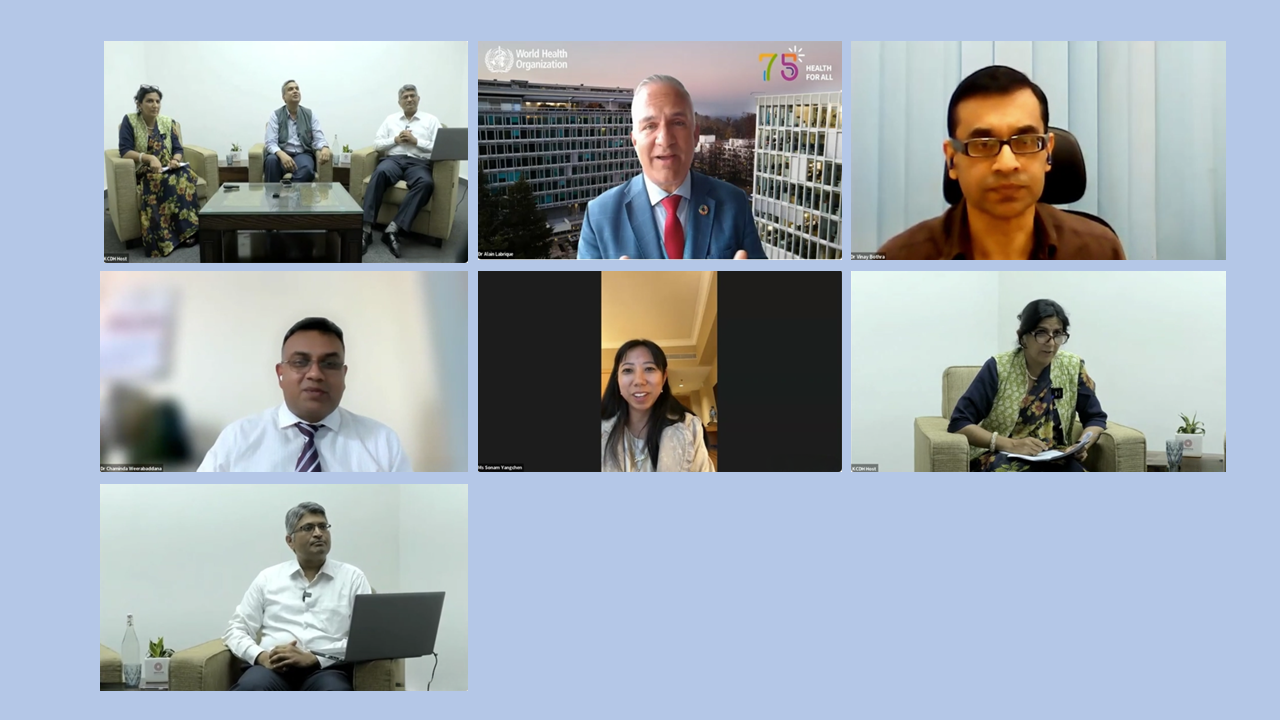
The World Health Organization (WHO), in collaboration with the Koita Centre for Digital Health (KCDH) at Ashoka University, India, today launched a year-long regional webinar series titled ‘ Responsible AI in Healthcare.’ The monthly series will convene experts from across the globe to explore how artificial intelligence can be harnessed to transform healthcare, equitably, safely, and sustainably, across the WHO South-East Asia Region and beyond.
Opening the inaugural hybrid session, Dr Karthik Adapa, Regional Adviser, Digital Health, WHO-SEARO said, “Today marks the beginning of an ambitious journey to explore how artificial intelligence can transform healthcare equitably, safely, and sustainably across our region… Without deliberate guardrails, AI risks amplifying inequities, eroding trust, and compromising patient safety.” He highlighted that the goals of the webinar are “to clarify the principles of Responsible AI, showcase practical lessons from deployments and missteps, provide toolkits for stakeholders, and build a regional network committed to human-centered AI innovation”.
Delivering the keynote, Dr Alain Labrique, Director, Digital Health, and Innovation, WHO HQ, emphasized that “we stand at a crossroads… One path leads towards equity, where AI supports universal health coverage and transforms care for billions. And the other path risks deepening inequality, privileging those who can afford access, while excluding those who cannot.” He outlined four pillars for Responsible AI: transparency, accountability, inclusiveness, and sustainability, noting that “Responsible AI in health isn’t about performance. It’s about purpose, process, and protection.”
The panel discussion was moderated by Dr Anurag Agrawal, Dean of BioSciences and Health Research at Ashoka University, who steered the discussion towards practical, real-world applications of AI in health care. The discussion featured regional perspectives. Dr Chaminda Weerabaddana, specialist in Health Informatics, Ministry of Health and Mass Media, from Sri Lanka, highlighted the importance of addressing real problems in the health sector especially in low and middle income countries such as human resource, burden of data entry, poor quality data, language barriers, “we must focus on low risk and high evidence solutions,” such as language translation, data quality improvement, and disease surveillance.
Dr Vinay Bothra, Health Policy Advisor, WHO Timor-Leste, cautioned against adopting AI purely for fear of missing out on its perceived leapfrogging potential. He emphasized, “Are we using AI for better and quicker diagnosis or for better health outcomes? A quicker diagnosis is just a pathway, but our North Star is not quicker diagnosis. It's better health outcomes.”
“We should really build, focus on building trust and transparency,” said Ms Sonam Yangchen, Health Policy Support Officer, WHO Bhutan, stressing the importance of ensuring that “AI and DPI must be explained or demystified for all players in our health systems, as there are different levels of understanding. The health policy makers, the frontline workers, and the citizens, their understanding level differs.”
Outlining India’s AI mission, data initiatives, and real-world validation efforts, Dr Mona Duggal, Director, ICMR- National Institute for Research in Digital Health and Data Science, said,” This is not just about tools and technology, it's about trust, accessibility, and equity in health innovation.” She added, “the idea was not just to co-create in India, it was to make AI work in India by building indigenous tools, promoting responsible research, fostering public trust, and conducting research to support collaboration across sectors.”
WHO and Ashoka University formalized their collaboration on December 17, 2024, through a project collaboration agreement designed to leverage WHO’s global health leadership and Ashoka University’s academic expertise. This partnership focuses on advancing public health research and innovation, with emphasis on joint initiatives in digital health, interdisciplinary research, capacity building, and knowledge sharing to tackle global health challenges and foster sustainable solutions.
The webinar series which is on until July 2026 will cover topics ranging from ethical data governance to AI and telemedicine, aiming to equip Member States, healthcare providers, researchers, and technologists with actionable insights to advance the responsible use of AI to transform healthcare for everyone, with equity, dignity, and better health for all.
